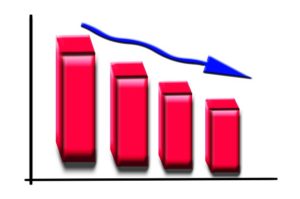Selling a Business: Will Rising Rates Impact Sellers?
04 July 2022: Selling a Business: Will Rising Rates Impact Sellers?
Our post two weeks ago was about how the current market environment might be effecting the appetite of small private equity groups (PEGs) and family offices to continue their maniacal pursuit of quality businesses. That post focused specifically on three characteristics of the current environment that would suggest that both groups, known for their analytical approach to acquisitions, might become less active.
Those three characteristics are inflation, interest rates and the pool of capital available to fund acquisitions. All three are important considerations when selling a business.
Headwinds
In a nutshell, the arguments went like this:
- Interest Rates: Higher interest rates mean that, to attract the investment capital, the investments a PEG makes must be profitable enough to stay competitive with other, less risky investments.
- Inflation is Rising: Inflation will impact almost every business’ revenue stream, payroll costs, cost of goods and, at more than five bucks a gallon (U.S.), £1.85 per liter (U.K.) and €1.94 per liter in Deutschland, everything that moves from one place to another. That means everything.
- Capital Availability: A significant source of acquisition capital has been the equity markets most of which have, with the brief exception of the lockdown-induced slump of March 2020, been on a tear since the 9th of November 2016; until mid-January of this year, that is. Anybody who has even a modest investment in anything has been watching major markets crater. The pool of capital is shrinking.
Against this backdrop, last week I read in a respected financial publication as article entitled, “Why Interest Rates Will Not Impact The Business For Sale Market.”
__________________________________________________________________________________
We offer a comprehensive coaching program – both group coaching in our Brokers’ Roundtable community as well as one-on-one coaching – tailored to Realtors, business owners , buyers and anyone interested in valuing, buying or selling a business.
If you’d like to learn more, email me at
jo*@Wo*******************.com
___________________________________________________________________________________
 As can be intuited from the title, the author is of the opinion that rising rates will NOT impact efforts by business owners to sell their business. He posits that, “Business buyers simply need to get used to a new basis. The low interest rates we have experienced in recent years were not always the case, and businesses did not stop selling. Anyone who wants to buy or sell a business needs to … adjust their thinking.”
As can be intuited from the title, the author is of the opinion that rising rates will NOT impact efforts by business owners to sell their business. He posits that, “Business buyers simply need to get used to a new basis. The low interest rates we have experienced in recent years were not always the case, and businesses did not stop selling. Anyone who wants to buy or sell a business needs to … adjust their thinking.”
Yes, businesses will continue to sell – as has been the case for centuries. Indeed, our tagline is “Every business that doesn’t fail will be sold…Every one!” But what does “…adjust their thinking” mean?
We’ll get to that in a moment.
PEGs
 Related to our post two weeks ago with regard to private equity groups, the author of the above-referenced article rightly points out that PEGs have to deploy their capital; they’ve GOT to buy something.
Related to our post two weeks ago with regard to private equity groups, the author of the above-referenced article rightly points out that PEGs have to deploy their capital; they’ve GOT to buy something.
PEGs are generally required to return the money their investors give them – with a handsome return tacked on – within a relatively short time window; almost always in less than 10 years. With such a deadline, they’re under pressure to find businesses to acquire and to grow those businesses. If they don’t invest their funds, they have to give those funds back to their investors – which they’re absolutely loathe to do.
_____________________________________________________________________________________
REALTORS! Our course, “Learn How to Value and SUCCESSFULLY Sell Businesses“, teaches you how to accurately value and successfully sell businesses.
Don’t Miss Out on the Coming “Silver Tsunami”!
But, the key take-away of the previous paragraph is that PEGs have to return their investor’s money “with a handsome return“. And those returns have to reflect the returns available to investors in other investments, the risks or safety of those other investments, the illiquidity of business ownership and the potential to grow the acquired businesses in the face of rising interest rates and a contracting economy
When selling a business, sellers – and brokers – must be cognizant of the buyer’s need for an acceptable return on their investment in that business.
The Impact on Prices
Whether higher interest rates will impact the activity in our industry is an issue that can – and will – be debated for a little while yet. (The answer should become evident within 12 months.) But even if deal-flow does not subside (a poor bet in our opinion), it’s guaranteed to impact valuations – and, thus, prices.
This is the element of this debate that the author of the referenced article touched on with no more than the most obscure reference; to wit, when selling a business in the future, higher rates “……may serve to lower multiples from their insane current levels.” All you three-digit IQ wizards out there know exactly what he meant: valuations and prices will fall. This is arguably the most significant impact of higher interest rates on both sellers and business brokers.
We alluded to this toward the end of that two-weeks-ago post when we wrote, “But there’s an extremely important and oft-overlooked aspect of business valuation that sellers and business brokers must keep in mind. And that aspect is a buyer’s required return on [their] investment.”
 From PEGs and family offices to search firms and individual investors, buyers consider potential acquisitions through several lenses. One of the most important is the potential return on their investment.
From PEGs and family offices to search firms and individual investors, buyers consider potential acquisitions through several lenses. One of the most important is the potential return on their investment.
Any moderately sophisticated buyer has a target ROI and that ROI dictates, as much as anything else, whether the buyer will invest in (acquire) a particular business. It would seem obvious that, if the buyer requires a ROI of 10%, they won’t consider any business a candidate for acquisition if that business will provide a ROI of only 8%, right?
Well, they might. If the deal can be negotiated to provide that 10% return.
And how could that possibly happen? There’s only one way: a lower acquisition price.
The Basic Math
Like any other expense, interest expenses impact the bottom line – the Discretionary Earnings – in several ways.
 If an acquisition is to be completed with a $1 million loan, the interest on that loan at X% will require X amount of the business’ revenue to repay that loan. If that rate rises to XX%, the interest expense (and repayment amount) has to rise commensurately – which reduces the Discretionary Earnings accordingly. Given that most small businesses are valued based in large part on Discretionary Earnings, lower DE has to result in lower valuations.
If an acquisition is to be completed with a $1 million loan, the interest on that loan at X% will require X amount of the business’ revenue to repay that loan. If that rate rises to XX%, the interest expense (and repayment amount) has to rise commensurately – which reduces the Discretionary Earnings accordingly. Given that most small businesses are valued based in large part on Discretionary Earnings, lower DE has to result in lower valuations.
It’s that simple.
But higher interest rates impact other costs, as well. Most notably “occupancy costs” such as rent and utility costs, all of which are impacted by interest rates, further lowering Discretionary Earnings and, thus, valuations. And they will also impact future lending costs: credit lines, expansion capital, open lending facilities, etc., used by many businesses. As rates rise, the cost to the business for each of these expenses rises, reducing Discretionary Earnings. The inevitable result is lower valuations.
The Bottom Line
The author of the article referenced at the beginning of this post states that “…the increase of a few percentage points will have a marginal effect on cash flow.” While that may be true as it relates to the interest expense line item, it is not true on an overall basis. When consideration is given to all the other rate-sensitive line items in the list of a business’ expenses on the operating statement, interest rates can have a meaningful impact on cash flow.
 The author further states that, “Even if rates skyrocket, if the business cannot adequately service the debt because of the increased cost of debt service, then it is probably not a good business to buy regardless of the interest rates.” In our view, this is a rather narrow-minded opinion. A business may be marginally attractive in an environment of low rates but in many cases such marginal businesses can be made infinitely more attractive – especially if the price is lowered.
The author further states that, “Even if rates skyrocket, if the business cannot adequately service the debt because of the increased cost of debt service, then it is probably not a good business to buy regardless of the interest rates.” In our view, this is a rather narrow-minded opinion. A business may be marginally attractive in an environment of low rates but in many cases such marginal businesses can be made infinitely more attractive – especially if the price is lowered.
Though we agree with the author of that article that businesses will continue to sell – particularly given the growing Silver Tsunami – we believe that higher interest rates will certainly impact our market by putting downward pressure on valuations and, thus, prices.
Businesses may take longer to sell as sellers “adjust their thinking”. And some sellers, having planned for a life post-closing, may reconsider selling in the face of both a lower sale price and inflationary pressures on the cost of doing anything with the proceeds.
If you have any questions or comments on this topic – or any topic related to business – I’d like to hear from you. Put them in the comments box below. Start the conversation and I’ll get back to you with answers or my own comments. If I get enough on one topic, I’ll address them in a future post or podcast.
I’ll be back with you again next Monday. In the meantime, I hope you have a safe and profitable week.
Joe
Searching For…
A family-funded buyer seeking to acquire a U.S.-based consumer products business with between $200,000 and $500,000 in Discretionary Earnings.
If any of you know of something that might fit, please let me know.

#business #businessacquisition #sellabusiness #becomeabusinessbroker #businessbrokering #businessvaluation #MergersandAcquisitions #buyabusiness #sellabusiness #realtor #realestateagents
The author is the founder, in 2001, of Worldwide Business Brokers and holds a certification from the International Business Brokers Association (IBBA) as a Certified Business Intermediary (CBI) of which there are fewer than 1,000 in the world. He can be reached at
jo*@Wo*******************.com

Hey Joe,
I appreciate another great blog from you. I understand your point about rising interest rates affecting a businesses bottom line, but I would like a clarification. In the portion of your course covering valuing a business, we always added back the interest since it is considered discretionary. So, in doing a valuation, the interest rate doesn’t impact the SDE so it won’t impact the SDE multiple value either. Where to these rising interest rates creep in and lower the value? In the course you covered doing a Debt Coverage test. Is that where the higher interest rates lower the business value? I also suppose that if one created a model of future cash flows that included debt repayment that higher interest rates would take a toll on values there too. Just making sure I understand where in the calculations these lower values due to higher interest rates will show up. Thanks again, Scott